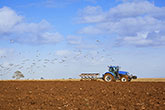PhosAgro welcomes EU-wide cap on cadmium levels in fertilizers
Published by John Williams,
Editorial Assistant
World Fertilizer,
PhosAgro has welcomed the final decision taken at the level of the European Parliament and the European Council to limit the sale of phosphate-based fertilizers containing high levels of heavy metals everywhere in the EU from 2022 and to introduce voluntary green labelling for fertilizers with less than 20 mg Cd/kg P2O5 starting this year.
This is a historic decision is aimed at improving the safety and sustainability of agriculture in Europe, as well as reducing risks to human health and the environment around the world.
The decision of the European Council is the final step to establishing the cadmium limit in phosphate-based fertilizers across Europe. EU-wide cap on cadmium levels will come into full effect in 3 years.
PhosAgro board of directors chairman Sven Ombudstvedt said: “The decision taken by the European Council is particularly important given growing concern about the quality and safety of food across the world. While our fertilizers meet even the most stringent requirements in terms of purity, we welcome this decision, since the main beneficiary of the implementation of this EU initiative will be the residents of Europe, as well as consumers of food produced in the worldwide.”
PhosAgro board of directors member and former UNESCO director-general Irina Bokova said: “Ensuring food security, healthy standards of living and general well-being are some of the most pressing global challenges facing humanity. The decision on cadmium limits is a step in the right direction. Providing the world’s growing population with high-quality food requires responsible approach and participation by everyone, from fertilizer producers and scientists to heads of states. PhosAgro, whose products are used by consumers in 100 countries around the world, understands its responsibility and is continuously working to create a more advanced, high-quality product that meets the most stringent requirements, as well as to make greater contribution to solving global challenges.”
PhosAgro CEO Andrey Guryev said: “Fertilizers produced by PhosAgro naturally meet even the most stringent limits under the green labelling initiative, and we are pleased that our customers will soon be able to make more informed choices about their crop nutrients when growing food for consumers both in the EU and across the world.
“PhosAgro held a less than 15% share of the European market for phosphate fertilizers in 2018, and the new requirements are not expected to have a significant effect on our diversified sales structure in the region. Notably, this creates incentives for fertilizer producers all over the world to continue to develop and to improve their operations in order to meet the growing demand for high-quality food both in Europe and globally.
“The key element of the company's strategy to 2025, which was approved by the board of directors this March, is sustainable development, which also implies PhosAgro's contribution to solving global issues such as food security and improving the health of the global population. The company welcomes the historic decision taken in Europe to limit the circulation of fertilizers with high cadmium content, because it creates positive long-term effects for the sustainability of agriculture and food producers not only in Europe, but around the world.”
A number of European countries as early as the 1980s already recognised the importance of this issue and unilaterally introduced strict cadmium limits for fertilizers. Limits are currently in place in 21 EU countries, with the strictest in Switzerland, which limits cadmium to 21 mg/kg P2O5 in 1986, Sweden (44 mg / kg P2O5), the Netherlands (31 mg/kg P2O5), Hungary and Slovakia (20 mg/kg P2O5) and Finland (22 mg/kg P2O5).
Read the article online at: https://www.worldfertilizer.com/phosphates/28052019/phosagro-welcomes-eu-wide-cap-on-cadmium-levels-in-fertilizers/
You might also like
Pivot Bio expands distribution of chemical fertilizer technology
Pivot Bio has expanded its retailer network through a partnership with Aurora Cooperative for the distribution of its chemical fertilizers in the US.


